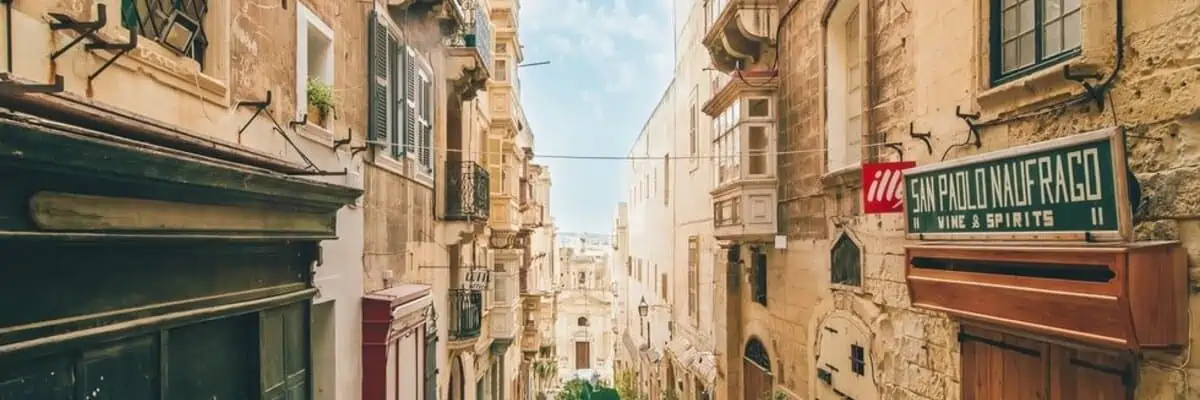The archipelago nation of Malta located in the Mediterranean Sea can easily capture the imagination of international contractors looking for clients in a unique setting. There is a demand for talented workers in many industries, and it can be worthwhile to look into contracting in Malta as your next destination. Malta is a member of the European Union, which will smooth the process for EU nationals.
As you search for clients, it is advised to review what will be required to work in Malta as a contractor, and what options you have for getting paid, establishing residence, and managing taxes. This guide will give you an idea of how to begin, and set yourself up for a successful stay.
Do I need a visa to be a contractor in Malta?
EU nationals do not need a work visa in Malta and only must apply for a residence permit. Non-EU citizens from ‘third countries (including the UK post-Brexit) can apply for a self-employment visa. However, the requirements are onerous, including a EUR 500,000 investment of capital, so most likely not suited to the average contractor. Still, there are options for a non-EU citizen to work in Malta.
How do I get paid as a contractor in Malta?
The way that you structure your contracts and choose to get paid is very crucial. This is so because it will affect immigration, taxes, and retained earnings. Here are the primary choices;
Work as a self-employed freelancer
This is viable for EU nationals given the work visa barriers unless you can convince your client about visa sponsorships. This might take the form of employment in that case, which is fine if you only work with one Maltese client and don’t mind giving up the independence of contracting.
If you can enter and work as a self-employed, you will contract directly with your clients and arrange the milestone and payment terms. You might have to take some time to gain a new client’s trust if it’s your first experience contracting in Malta.
Set up your own limited company
EU citizens can also set up a limited company and use that entity to contract with clients. In Malta, that requires capitalization of EUR 1200, along with typical business registration steps. Having a limited company can give your clients some assurance that you are reliable and take contracting seriously.
Your limited company will contract with the client, and you may also be responsible for corporate tax or VAT if your earnings are high enough.
Work with an umbrella company in Malta
An umbrella company in Malta can be a real asset for a contractor of any nationality, as they can sponsor work visas, set up the local contract, and facilitate timely payment. They are a third party to your relationship with the client, which can be helpful to minimize any cultural differences and establish trust.
The client contracts with the umbrella company, which would issue payment to the contractor after withholding taxes and social contributions. This all saves you the tasks of contract administration and payment, allowing you to focus on your work.
How do taxes work for contractors in Malta?
Like most countries, Malta has its unique system of taxation and some special provisions for non-resident workers.
Tax rates
Tax rates are progressive in Malta, based on annual income and ranging from 0-35%. The rates are the same for residents and non-residents. However, each has different income thresholds (the tax rates kick in at lower thresholds for non-residents). There is also a special ‘part-time self-employment’ rate of 15% if your income is less than EUR 12,000 per year.
Tax residency rule in Malta
Malta uses the 183-day rule for tax residency, and any stays beyond that will result in taxation of worldwide income. You would then have to look to a tax treaty with your home country to avoid double taxation. If you can show that you are domiciled in another country, Malta may only tax Malta-sourced income.
How to file taxes in Malta
Every foreign individual contracting in Malta must register and obtain a nine-digit tax id number, either in person, by post, or online.
If you work through an umbrella company, they will withhold taxes using the PAYE system, based on projected annual income. Then, all you have to do is file a year-end tax return, assuming the withholding covers your tax liability. In some cases, the tax authorities will issue a Tax Statement of what is owed, which if you find accurate you don’t have to file a return.
Those working as self-employed or through a limited company will have to handle tax payments and filing on their own, or with a local accountant.
If filing on your own as self-employed, you must make three payments of 20%, 30%, and 50% throughout the year, based on your self-assessment of tax liability. This would be arrived at based on projected earnings minus expenses, and applying the correct tax rate based on residency status.
The tax return must be filed by June of the following year, and any owed taxes paid immediately. All tax payments can be made online at the government tax authority’s website.
What are the social security contributions in Malta?
The social security contribution for self-employed contractors is 15% of earnings, although EU citizens may be able to avoid this if they remain on their home country’s social security program. Social security contributions can be made online just as with tax payments.
How do I stay compliant while contracting in Malta?
The main compliance concerns for individuals contracting in Malta are
- Making correct tax payments
- Meeting immigration requirements and
- Paying social contributions.
Each of these can apply to expat contractors in Malta, and depend on a number of criteria that may be difficult to learn if you are new to the country.
The easiest way to remain compliant given all the variables is to use an umbrella company as your local partner in Malta. They are already well-versed in the rules for self-employed contractors and can help you get started with the contract. They can also facilitate all of the compliance-related steps on your behalf.
Using an umbrella company is the best way to avoid any misclassification issues or violating any self-employment rules. Aside from compliance, here are the other benefits of using an umbrella company:
- First, handle all client payments, tax withholding, and any social contributions
- Secondly, issue you a payslip each month, to a local or foreign account
- Thirdly, sponsor work permits for non-EU citizens
- Then, help set up the contract with the client
- Moderates any disputes with your client
- Last but not least, advise on access to totalization and double taxation treaties
We have experienced umbrella companies in Malta who are ready to help you right away, even before you leave home. Please contact us for more information on how an umbrella company can be your essential partner in international contracting.
FAQs
How do I become a contractor in Malta?
The first step is to look into immigration requirements. If you are an EU citizen (or have a residence permit in an EU country) you dont need a work permit. You can work as self-employed or with your own limited company.
Non-EU citizens must have a work permit, either as an employee of their client, or through a self-employment residence permit. The latter requires EUR 500,000 investment, so it’s not that practical. The best option for you is to use an umbrella company to sponsor your permit.
What is an independent contractor according to Malta’s law?
The general rule is that an individual is an independent contractor if the client/payer has the right to control or direct only the result of the work. They cannot control what will be done and how it will be done. If you are an independent contractor, then you are self-employed.
What is a definite contract in Malta? What is an indefinite contract in Malta?
Both definite and indefinite contracts in Malta relate to employment, not contracting. But if you were to become an employee of your client they would offer you one of these. Definite contracts are for a finite time period, and can be renewed for a maximum of four years. After that an indefinite, open ended contract must be offered.
What is illegal in Malta?
Aside from typical crimes, there is a strong prohibition against both drugs and firearms in Malta. So best to stay away from those.
How can I find a job in Malta?
You can either use a recruitment agency, search online international job boards or target specific companies in your industry. If you have a strong professional network through past experience or social media, you can put out the word of your interest and skills.
What is a good salary for a couple to live in Malta?
Malta is not the cheapest destination in the EU, although it does have qualities that can make it worth the expense. You will probably need at least EUR 3000 per month for a couple to live comfortably. This is also close to the minimum income needed to qualify for Malta’s digital nomad visa, so is probably a good estimate.
What are the chances of getting a Permanent Residence (PR) in Malta?
The chances are excellent if you meet the requirements. A PR through the Golden Visa program requires a minimum rental/purchase of property, and a one time contribution of EUR 28,000-58,000. There is an administration fee of EUR 40,000. This might be out of reach for most contractors, but it is possible to obtain.
How much more should a contractor make than an employee?
All contractors negotiate their rates based on skills and value to the client. Pegging your rates to employee compensation is one way to estimate relative value. If you know the average salary for a position, you can add a percentage that would be equal to employee benefits such as health care, pension or covered expenses.
What is it like to live and work in Malta?
As an island nation is Malta expensive to live? What are rental prices like?
Malta is actually less expensive than other EU countries. In general, the cost of renting an apartment or house in the capital city, Valletta, or other popular areas like Sliema and St. Julian’s tends to be higher compared to smaller towns or rural areas. A one bedroom apartment will range from EUR 600-1200 per month in Valletta.
Where can I meet and socialise with other expats in Malta?
There are many expats in Malta so it’s rather easy to meet fellow travellers and workers.
Here are some spots in Valletta:
Strait Street, known as “The Gut” in the past, is one area where expats congregate. This historic street has transformed into a trendy spot with bars, restaurants, and entertainment venues. You can also check out St. George’s square or the Bridge Bar near the waterfront.
What language do people speak?
Both Maltese and English are official languages in Malta, so you should be fine as an English speaker. All secondary education and higher, is in English, so there is no language barrier for working in Malta and you will be able to socialise with no problem.
What is the food like in Malta?
Malta offers a unique blend of Mediterranean cuisine and its own distinctive dishes. Of course seafood is fresh and plentiful, but you can also find Maltese rabbit stew (Stuffat tal-Fenek) an iconic local dish. You will also want to try Kapunata, Malta’s version of ratatouille, made with eggplants, tomatoes, onions, garlic, and other vegetables, typically served as a side dish and Aljotta, a hearty fish soup, often flavoured with tomatoes, garlic, and rice.
What is the healthcare system like?
Malta has a well developed public healthcare system that offers medical services to citizens and residents. If you pay into the social system and have some type of residency then you can access it, and quality of care is excellent.
Expats living in Malta are required to have private health insurance that covers them during their stay in the country. Some expats may also be eligible for public healthcare services depending on their residency status.
Is there a public transportation system?
As a small island, traffic is a problem in Malta and so both residents and visitors use public transportation frequently. The primary system is a modern bus network that covers the island, offering a convenient and cheap way to get around.
What kind of recreation will I find in Malta?
As an island, Malta is surrounded by beaches and coastline and the warm Mediterranean climate and clear waters make Malta an ideal location for various water sports. You can enjoy activities like snorkelling, scuba diving, windsurfing, paddleboarding, and jet skiing.
If you like sightseeing Malta is rich in history, and you can explore numerous historical sites and ancient ruins, including the UNESCO World Heritage-listed city of Valletta, the ancient temples of Ħagar Qim and Mnajdra, and the mediaeval city of Mdina.





